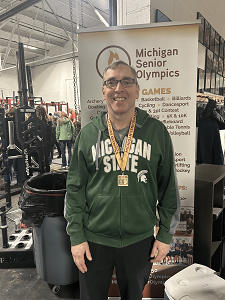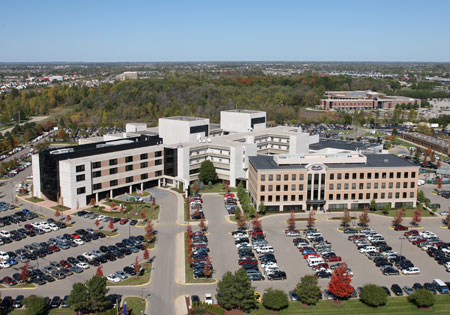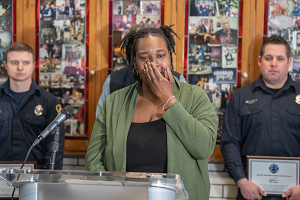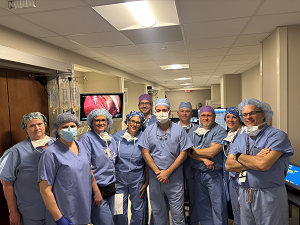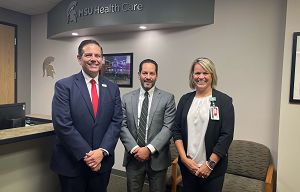Henry Ford Health System Braces for a Tough January with Rising Hospitalizations, Infections

DETROIT (January 4, 2022) – Henry Ford Health System said Tuesday that the effects of the holiday curve and the fast-spreading Omicron variant have led to increased COVID-19 hospitalizations and infections in the first week of the new year.
During a briefing with reporters, Adnan Munkarah, M.D., Executive Vice President and Chief Clinical Officer, and Dennis Cunningham, M.D., System Medical Director of Infection Control and Prevention, said the health system was bracing for one of the toughest months yet in the pandemic, now in its 22nd month.
Henry Ford reported 480 patients were hospitalized or waiting to be admitted, a 25 percent increase in the past week. That included a child under 17 who was unvaccinated.
For the week of Dec. 26, Henry Ford reported that nearly 5,000 people had tested positive for COVID – the highest number seen in one week for the entire year in 2021.
“This pandemic is not slowing down and we’re still surging,” Dr. Cunningham said, adding that Michigan won’t seek a peak in the numbers for several weeks. “That’s why we are very concerned about January and think it’s going to be a very rough month in terms of COVID.”
According to a vaccination graphic released on Monday, 65 percent of Henry Ford patients hospitalized for COVID were unvaccinated. Of 60 patients hospitalized in the ICU, 65 percent had not had any shots. Of the 22 patients on ventilators, 68 percent had not received any shots. In addition, Dr. Munkarah said, 95 percent of those hospitalized and in the ICU, had not received their third vaccine dose, underscoring the benefit of a booster.
“It is clear that the vaccine continues to be protective, and the booster seems to have a significant effect in protecting people from getting into the hospital,” Dr. Munkarah said. With a decision by the CDC to approve a booster dose for children ages 12 – 15 imminent, Dr. Munkarah said parents should not delay scheduling a booster appointment for their children.
Dr. Munkarah acknowledged that people who are vaccinated and receive a booster dose may still get a breakthrough infection. But, he added, “these infections tend to be much milder.”
Dr. Munkarah said the health system is closely watching two areas of concerns: Bed closures and team members who are off work because of a COVID exposure due to community spread. As of Monday, Jan. 3, 97 beds were temporarily closed across the health system due to staffing challenges. These included 52 at Henry Ford Hospital, 34 at Henry Ford Wyandotte Hospital and 11 at Henry Ford Allegiance Health in Jackson. Together, these hospitals account for more than 1,550 beds out of the more than 2,000 across the health system.
In the past seven days, 686 team members tested positive for COVID and are recovering at home. That represents about 2 percent of the entire Henry Ford workforce. Team members are quarantined for seven days from the time their first symptom appeared. That quarantine time could be extended if their symptoms persist longer. “Our first priority is to make sure we don’t infect our patients,” Dr. Cunningham said.
Other key highlights from the briefing:
- Because of a limited supply of the monoclonal antibody drug sotrovimab, the criteria for who is eligible to receive it has now changed to include the following groups: People 75 years and older, people who have severe lung disease and use supplemental oxygen, people on dialysis, people with a BMI greater than 40, people who are immunocompromised and pregnant women. A doctor’s order is required for treatment. Sotrovimab is effective against the Omicron variant as well as Delta, Dr. Cunningham said, and it’s the only monoclonal antibody drug now being used at Henry Ford.
- The COVID antiviral pills from Pfizer and Merck are expected to become available sometime this month. The Pfizer pill has a long list of drug interactions, which will limit how often it can be used in high-risk patients, Dr. Cunningham said.
Dr. Cunningham cautioned that neither the monoclonal treatment nor the antiviral pills are a substitute for vaccination. He also urged parents to schedule a vaccination for their children ages 5 to 11 years old.
“This age group spreads COVID quite easily and we need to keep them in school and safe, and the vaccine will build up their immunity so we can do this,” he said.
In addition to vaccination and booster shots, Drs. Munkarah and Cunningham emphasized that people continue to wear a mask in indoor public gatherings, avoid large crowds and wash their hands often. Dr. Munkarah also offered a message of optimism.
“I look at the silver lining that we are dealing with a variant that seems to be causing less serious illness at the present time. And the data is getting more convincing. That with a booster dose, we might have better protection,” Dr. Munkarah said. “The more we can get people vaccinated, the more people we can get boostered, these numbers will come down.
“We can still control it. It is in our hands. I’m optimistic that we’ll get over this. We need to get over it together.”
###
NEWS MEDIA ONLY may contact: David Olejarz / David.Olejarz@hfhs.org / 313-303-0606
.svg?iar=0&hash=F6049510E33E4E6D8196C26CCC0A64A4)

/hfh-logo-main--white.svg?iar=0&hash=ED491CBFADFB7670FAE94559C98D7798)
